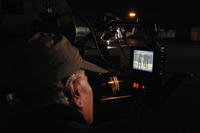We've hinted at this a couple of times since the fight between Israel and Hezbollah began. But the terror group, "with the sophistication of a national army... and the lethal invisibility of a guerrilla army" is a new breed of military animal. "A hybrid," Thom Shanker writes. "Old labels, and old planning, do not apply."
Hezbollah still possesses the most dangerous aspects of a shadowy terror network. It abides by no laws of war as it attacks civilians indiscriminately. Attacks on its positions carry a high risk of killing innocents. At the same time, it has attained military capabilities and other significant attributes of a nation-state. It holds territory and seats in the Lebanese government. It fields high-tech weapons and possesses the firepower to threaten the entire population of a regional superpower, or at least those in the northern half of Israel....
"We are in a world today where we have a non-state actor using all the tools of weaponry," from drone aircraft to rockets to computer hacking, said P.W. Singer, a senior fellow at the Brookings Institution who specializes in the impact of new technologies on national security.
But John Robb, who's been examining this kind of "open source warfare" for years, says that "the central secret to Hezbollah's success" isn't in its weaponry. It's in the terrorists' ability to have its "guerrillas to make decisions autonomously... at the small group level."
In every area -- from firing rockets to defending prepared positions... -- we have examples of Hezbollah teams deciding, adapting, innovating, and collaborating without reference to any central authority. The result of this decentralization is that Hezbollah's aggregate decision cycles are faster and qualitatively better than those of their Israeli counterparts... the continued success of its efforts has put the Israelis on the horns of a dilemma: either request a ceasefire or push for a full invasion of southern Lebanon (each fraught with disastrous consequences).
And not just for Israel. "Other terrorists are learning from Hezbollahs successes," Shanker notes. Iraqi insurgents are showing a similar blend of operational flexibility and modern technology. To beat these groups, the U.S. is going to have to learn that it "takes a network to fight a network."
American intelligence agencies and the military proved it can fight this kind of war, as it did in Afghanistan to rout Al Qaeda, when intelligence officers and small groups of Army Special Forces worked with local fighters to call in devastating air strikes and drive the Taliban from power.
Within the Bush administration and across the military, a clearer view is emerging out of the chaos in southern Lebanon. It is that nation-states know they cannot directly take on superpowers either regional or global without getting their clocks cleaned, and so they use proxies they train and support to take the fight to those superpowers. The fight against groups like Hezbollah requires a strategy for dealing with their sponsors. These networks, Hezbollah included, dont float around in the ether like free electrons bumping into each other. They alight. They attach themselves to territory. In Afghanistan it was with the full support of the Taliban. In Pakistan, its an ungoverned space. In Lebanon, its a state within a state. Cut off state support, or eliminate the ability of the networks to survive in ungoverned areas, and they collapse on themselves.
No solution has been written. But it would include military force along with diplomacy, economic assistance, intelligence and information campaigns.
"Most critically, we have to get better at its such a clich winning hearts and minds," said a military officer working on counterinsurgency issues. "That is influencing neutral populations toward supporting us and not supporting our terrorist and insurgent enemies."
And so the zillion-dollar question becomes: Do big air campaigns and large-scale invasions really influence those opinions in a positive way? Or do they just play into the terrorists' hands?
UPDATE 07/31/06 4:07 PM: Anthony Cordesman's answer: The U.S. -- and Israel's -- current course is "stupid, incompetent, and obsolete." Youch.








